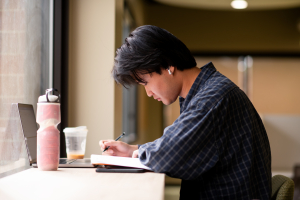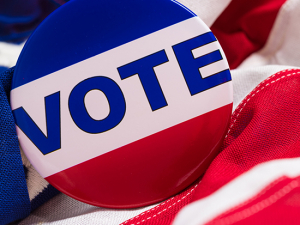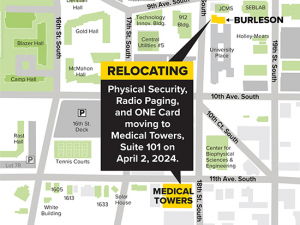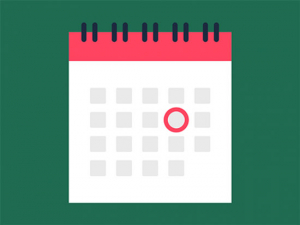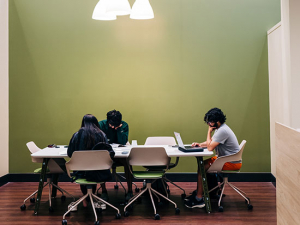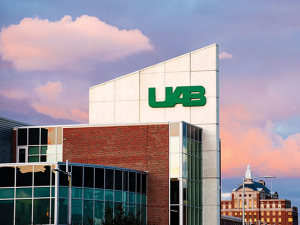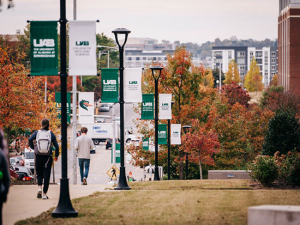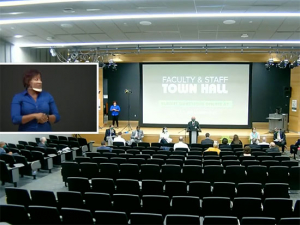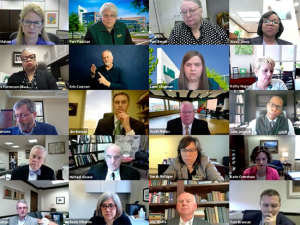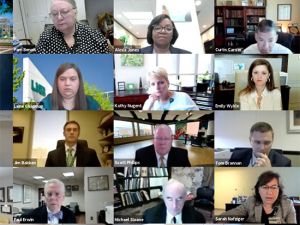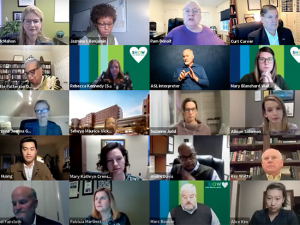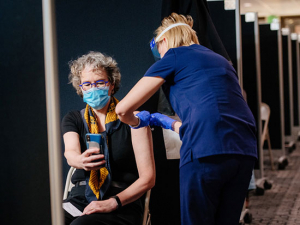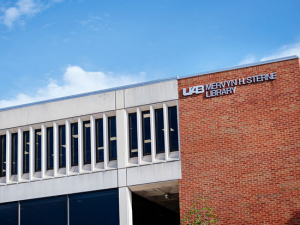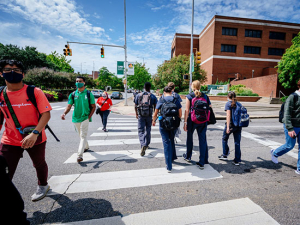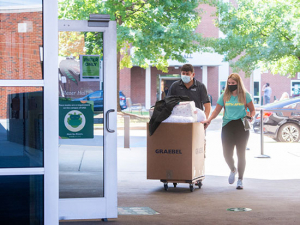Epidemiologist Suzanne Judd, Ph.D., infectious diseases specialist Michael Saag, M.D., and other campus experts shared data and advice on coping with COVID-19 at a student town hall Oct. 29. President Ray Watts and other senior leaders also answered student questions and discussed details on spring semester, completing Healthcheck over the holidays and more.
Answers to questions that could not be addressed during the town hall due to time constraints are provided below, along with a summary of some important dates mentioned during the event.
Scroll down to read the complete summary or use the links below to jump to specific topics
Healthcheck and Student Health questions
Healthcheck during the holidays
Internship, research and shadowing opportunities
Financial support and scholarships
COVID-19 immunity and treatments
Final exam spaces
“We understand that many of you are concerned about taking your final exams,” said Lori McMahon, Ph.D., dean of the Graduate School and chair of the university’s Entry Implementation Committee. “We know that some of you live in places in our state or even out of state where your WiFi access may not be stable.”
Students will be able to register to use spaces on campus in Sterne Library and Lister Hill Library up to two weeks ahead of their exam time, McMahon says. Students will be able to reserve a three-hour block of time. Learn how to register here.
[back to topic list]
Healthcheck and Student Health questions
Healthcheck during the holidays
McMahon explained how the daily Healthcheck requirement will be handled during winter break:
- Undergraduates and non-thesis or online master’s students: Beginning Nov. 21 and continuing through Jan. 11, these groups will not be required to participate in the daily Healthcheck and sentinel testing as long as they have moved out of on-campus housing, McMahon says.
- Students remaining in residence halls, students enrolled in 698/699 non-thesis and thesis research, students enrolled in 798/799 non-dissertation and dissertation research, students in clinical programs and students in Athletics programs: Daily participation in Healthcheck and sentinel testing is required for these groups.
By Jan. 11, all students will resume participating in daily Healthcheck.
Questions submitted online:
Q: If you don't come to campus for anything (exempt) and your courses are online is it necessary to do the Healthcheck?
All students who have a face-to-face or remote course in their course schedule are required to participate in daily Healthcheck. Only students who are enrolled in a fully online program and all courses that are Q courses are exempt. After Nov. 20, undergraduate students and non-thesis masters students will not be required to participate in daily Healthcheck until Jan. 11. All other students are required to continue to participate in daily Healthcheck through the end of the fall term.
Q: It seems that testing for the virus is partially replacing 14-day self-isolation for exposed persons, as we see in the sports world and in politics. Even at least one local Birmingham hospital is telling nurses to return to work if they test negative soon after a known exposure. We have been told that a negative test does not negate the requirement to isolate for 14 days after exposure. Has that recommendation changed?
| This information is accurate as of publication. For the latest information on testing procedures and protocols, visit the uab.edu/uabunited site. |
For the general population, a negative test should not replace a 14-day quarantine for exposed persons. This is explicitly stated by the Alabama Department of Public Health, which issues orders for the State of Alabama, based on CDC guidance and local epidemiology. As many health care workers are considered essential personnel, and hospitals may be facing staffing shortages, the guidelines may differ for nurses working in their employee role. This would not be the case for students working in a health care setting in a student role.
Q: How are students and employees (campus and hospital) supposed go about completing the Healthcheck if they are negative for both flu and COVID but they still have allergies due to seasonal changes?
Healthcheck advises against reporting symptoms that have already been reported and evaluated. Healthcheck is meant to detect new symptoms, so only new or changing symptoms should be reported.
Q: If I am a clinical student will I have to come back for sentinel testing even if I am not in the city anymore during Christmas and fall break?
No. Sentinel testing only applies to students and employees who are currently studying or working on campus.
Q: How do I find out whether or not I'm in the pool from which students will be selected for sentinel testing? I have not been on campus since March.
The sentinel testing pool is composed of students who are enrolled in at least one face-to-face or hybrid class. If you are fully remote you are not in the sentinel testing pool.
[back to topic list]
Moving out of residence halls
November 20 is the last day for students to be in the residence halls, says Marc Booker, executive director of Student Housing and Dining. Students are not required to take everything out of their rooms, but “be thoughtful about what you want to take home and ensure that you take home your chargers, laptops, textbooks, notes and anything you need to finish the semester,” including prescription medications, he said.
Students who wish to remain on campus after Nov. 20 should sign up for housing as soon as possible, Booker says. “One reason why that is important is because we will disable card access to the residence halls after the 20th to maintain a safe and secure environment,” he said. The fall meal plan will end on Nov. 20; meal options for those who remain in campus housing will be finalized depending on the number of students staying.
[back to topic list]
Camp Hall move questions
Questions submitted online:
Q: How will Camp Hall move-out work since they are transitioning it into an isolation dorm?
At this time, the urgency of the Camp Hall move has been relaxed. More information will be emailed to residents related to the Camp Hall move.
Q: Can you clarify what is going to happen to Camp Hall residents?
Camp Hall residents will have the OPTION to move if they wish prior to Nov. 20. Unfortunately, Green Hall will not be ready for occupancy prior to Nov. 20.
Q: Is there any possible way to delay the Camp Hall relocation?
Yes. More information will be emailed to Camp Hall residents soon.
[back to topic list]
Spring semester questions
Re-entry testing for spring semester
Students moving into residence halls will be required to participate in re-entry COVID-19 testing, likely through Verily and taking place at Bartow Arena, during move-in from Jan. 15–18, McMahon says.
Q: Will students have to quarantine in their dorms while they are waiting on results from the re-entry testing?
“Students who are moving into the residence halls will be signing up for a time to move in, and on that same day we would like you to sign up through Verily for your re-entry COVID testing that will take place at Bartow Arena,” McMahon said. “The hope is that your testing happens the same day that you move in. We are not requiring a quarantine during that time.”
Question submitted online:
Q: How will out-of-state students be tested when we return to campus in the spring? Will we be sent a self-administered test kit or should we anticipate scheduling our own test in our hometown outside of UAB?
Students are not required to test prior to coming back to campus. If you are a residential student you will need to schedule a time to test through GuideSafe on the same day as you move in. That appointment will be required to move in. The testing will be provided in Bartow Arena on the move-in dates of Jan. 15–18. All other students will be tested only if selected for sentinel testing (random testing).
[back to topic list]
Spring move-in
Campus housing “will re-open on Jan. 15 at 8 a.m.,” Booker said. “However, everyone does not need to return at that time. You will be getting information over the holiday period break about how to return and how to sign up for a return time.”
COVID-19 re-entry testing will be required for students living on campus, Booker reiterated. “Please plan to be tested the day that you return, and [as soon as possible] to the time that you pick to move back in,” Booker said. Athletes who may need to return before Jan. 15 should work with their coaches, he added.
[back to topic list]
General housing questions
Questions submitted online:
Q: How likely is it that students living on campus first semester will be able to get their housing contract release approved so they can live off-campus next semester?
We review all requests for cancellation individually and make decisions based on circumstances and the specific nature of each resident's request. While release is not guaranteed, we will work with our students and families during these unprecedented times.
Q: Are freshmen required to stay on campus for the spring semester?
Freshmen are required to live on campus their first year. If you have extenuating circumstances that prevent you from being able to comply, please email us at studenthousing@uab.edu.
Q: What dorm would we get if we are at home currently and will be dorming for the spring semester? Will we be able to pick out roommates?
Your residence hall and roommate options depend on your classification (e.g., freshman, sophomore, first year, etc.) and your roommate preference. Roommates are matched when possible. If you have a student with whom you would like to room, please identify that student in your application. Roommate requests must be mutual.
Q: Will we be allowed in other dorm halls next semester?
Currently, we are planning to maintain our social distancing guidelines with the residence halls in the spring. If and when it becomes safe for us to relax this policy, we will communicate that to our residents via email, signage and Residence Life staff.
[back to topic list]
Dining
Question submitted online:
Q: Will more dining locations be open next semester?
We will be adding Moe's and Slice of Life pizza in the Dining Hub at Green Hall.
[back to topic list]
Internship, research and shadowing opportunities
Q: What will happen to lab research or shadowing opportunities? Will there be any in-person opportunities in the foreseeable future?
Students interested in shadowing need to get permission through the clinical department where they want to shadow, McMahon said. “Reach out to your advisor to get help with contacting those individuals and departments for those activities.” As for research,
“research is being conducted right now and will continue after Nov. 20 when we move classes to the remote format,” McMahon said. “Those students who are engaged in research-intensive programs will continue their research.” Undergraduates who are also approved to do research, and are living locally, can continue to do their research, McMahon said, “but the details of how that will proceed after Nov. 20 will have to be discussed with the student’s research mentor.”
Question submitted online:
Q: With the complications of COVID and societal issues appearing this year, it has become difficult to secure an internship to meet my experiential requirement to graduate. I planned on graduating at the end of next semester. Will any leniency, assistance or other options be available for students in this situation?
Yes, faculty will continue to work with students to offer flexibility in requirements for completing internships and other requirements. Students should work with their advisors to review options. More organizations are offering virtual internship experiences, and students should explore these opportunities.
[back to topic list]
Financial support and scholarships
Questions submitted online:
Q: What financial support will be in place to help students impacted by COVID-19 next semester?
For students who have been impacted financially due to COVID-19, we encourage all students to have a current FAFSA on file. Please contact One Stop Student Services to request a conversation with a financial aid specialist to review your aid eligibility. Additionally, the university will continue to monitor any potential additional funding that may come available and will notify students accordingly.
Q: Will the Presidential Scholarship amount be raised as it was this semester?
The Presidential Scholarship will continue to cover tuition and related fees up to 15 credit hours per semester for students in good standing.
[back to topic list]
Accommodations for spring semester
Question submitted online:
Q: Will there still be DSS accommodations for COVID-19 in the spring?
Disability Support Services will continue to provide COVID-19 Temporary Adjustments to qualifying students during the spring term. Please visit uab.edu/dss, call 205.934.4205 or email dss@uab.edu to learn more about the registration process. Students who are considered higher risk according to the CDC — as well as students who (during the spring term) will be living with and/or providing care for an individual considered higher risk by the CDC — will follow the process as explained on the DSS website. Students who test positive for COVID-19 will be directed to follow the procedures established by Student Health Services. If a student and/or faculty member has questions or needs assistance about ensuring a course is accessible during quarantine or isolation, DSS will be available to provide consultation.
[back to topic list]
Events
Question submitted online:
Q: Will there be any modifications for reserving large spaces for events?
We continue to monitor the guidance for gatherings and events. Our UAB public health and medical experts help us monitor gathering sizes, and we will continue to use data to make decisions about events. Currently, the allowed number of attendees for on-campus events is 15 for indoor events and 30 for outdoor events. This guidance applies to registered student organization events and events planned by the Division of Student Affairs.
[back to topic list]
COVID-19 cases at UAB
Questions submitted online:
Q: According to the UA System COVID dashboard, we’ve reported a combined 176 positive cases between Oct. 2 and Oct. 22. Why has there been an increase in positive cases?
Contact tracing indicates the majority of cases resulted from large and small off-campus events where safety measures were largely ignored; many of these gatherings were the week of Homecoming. In response, the rise in cases and calls for vigilance were communicated to students, and interim policies were put in place to increase sanctions on off-campus gatherings.
Q: How many students have been diagnosed with COVID this semester?
These data are updated weekly on the UA System COVID-19 Dashboard at uasystem.edu/covid-19-dashboard.
Q: With the exception of the Homecoming game, where there were monitors wandering the stands, enforcement and adherence to distancing and mask-wearing policies at Legion Field has been far worse. What will be done to address this going forward, including for other sporting events such as basketball games at Bartow?
We are watching adherence to safety requirements at Athletics events carefully. While there are many instances of proper behavior, room for improvement has been noted. Athletics and Student Affairs continue to work together towards continued improved adherence. Violations may result in limits on attendance at future games.
Q: If cases continue to rise, will we have to shut down next semester?
We are continuously monitoring COVID-19 cases on- and off-campus and will continue to make evidence-based decisions with input from infectious disease and public health experts.
[back to topic list]
COVID-19 immunity and treatments
Q: Are people who have already contracted COVID-19 still potential carriers of the virus, despite their own current immunity?
After someone has contracted COVID-19, becomes asymptomatic and completes a 10-day isolation, “they are then considered immune at least for some period of time and they are not going to be infectious,” said Michael Faircloth, M.D., medical director for Student Health. “We don’t know yet about six months or a year later, but at least for some period of time they should be protected and not infectious.”
Question submitted online:
Q: I recently read great news about the increasing positive results from remdesivir. It was very promising to hear that the President himself took it during his recovery. Are there any updates?
“The biggest news regarding remdesivir was the recent release of the SOLIDARITY trial, which was a huge non-randomized trial in numerous countries comparing remdesivir to three other regimens,” said Jeanne Marrazzo, M.D., director of UAB’s Division of Infectious Diseases. “Despite its limitations, the trial is seen as a good ‘real-world’ test of remdesivir’s capacity to meaningfully impact disease. Unfortunately, its effect in these patients with COVID-19 who were hospitalized was modest at best: there was no improvement in survival or other endpoints felt important to measure impact on disease. The final results of an NIH-sponsored randomized trial were just published and did show that remdesivir shortened time to recovery in hospitalized patients. Most experts feel that it could be helpful if given early in disease at the time the virus is most likely to be multiplying in the body.”
[back to topic list]
Resources for online students
Questions submitted online:
Q: How do you get resources for COVID as an online UAB student?
There are many resources for online students during the pandemic. If you are talking about health-related resources, contact Student Health or visit uab.edu/students/health. If you need online learning resources, contact eLearning and Professional Studies or visit uab.edu/elearning. If you are not sure who to contact about your need, OneStop Student Services (uab.edu/students/one-stop) can likely point you in the right direction.
Q: What are some suggestions to combat Zoom fatigue?
It is important to find balance and schedule time to get outside, away from technology. Establishing boundaries in your day can also be helpful, such as planning for time to review coursework and study that does not involve video conferencing. For example, print out notes to read or listen to a recording of your pre-recorded classes while taking a walk. Resources on getting relief from technology, participating in Mental Health Mondays, and more are available here. We encourage students to work with Student Counseling Services if they are feeling stressed about the pandemic and the face-to-face restrictions surrounding it.
[back to topic list]
Staff working with students
Question submitted online:
Q: Why are some but not all staff members who work with students having to come to work on campus and risk exposure to the virus rather than telecommute when social distancing guidelines prevent them from meeting with students face-to-face?
Each department on campus has a plan reviewed through leadership that determines who needs to be on campus and who can do their work remotely. In some cases, particular employees want to be on campus as that provides them the best location to do their jobs more effectively. In those cases, leadership has ensured that all safety measures are and continue to be implemented while they are on campus.
[back to topic list]
